Master Weaver Keeps Centuries-Old Tradition Alive
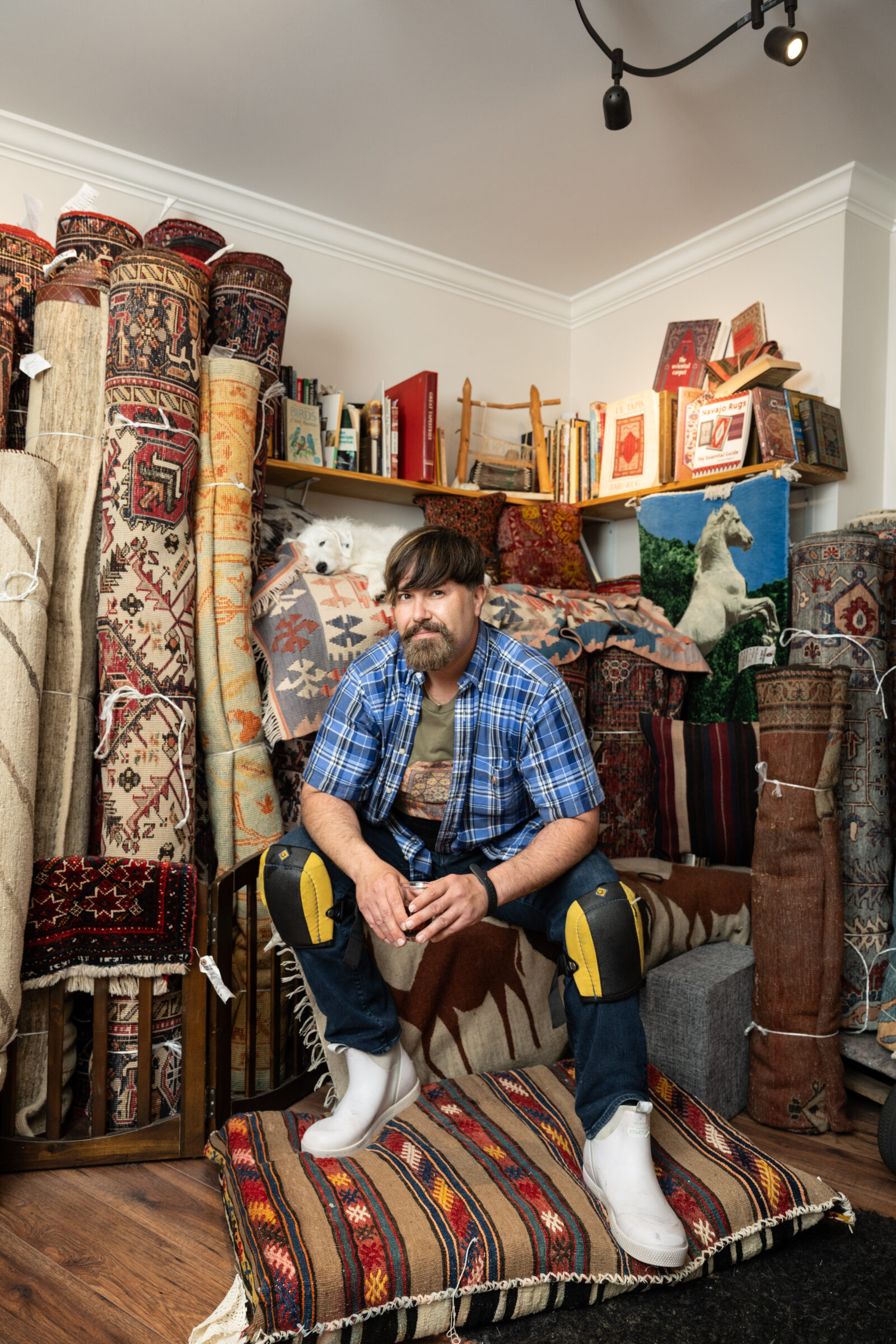
Written by Laticia Headings | Photos by Michael Butcher
“In here, I let everything go. It’s a very powerful place,” says Dustin Aliff of his shop, David’s Oriental Rugs & Care-full Carpets in The Plains.
Aliff and his father, David, have operated the businesses together since 1999. They specialize in selling new and antique Persian-style rugs and carpets, as well as cleaning and restoration. The younger Aliff does the carpet washing and repair while his father focuses on the dyeing, fringe work, and fine details. “I’m a doctor in restoration,” he says. “I work with handmade, one-of-a-kind rugs from around the world. I’m their caretaker.”
With inventory from Iran, Turkey, Pakistan, Afghanistan, the Caucasia region, as well as rugs from the 1940s or older from India and China, Aliff says, “We have the best tribal, nomadic carpets from all the premium countries, but we also sometimes find them in peoples’ attics.”
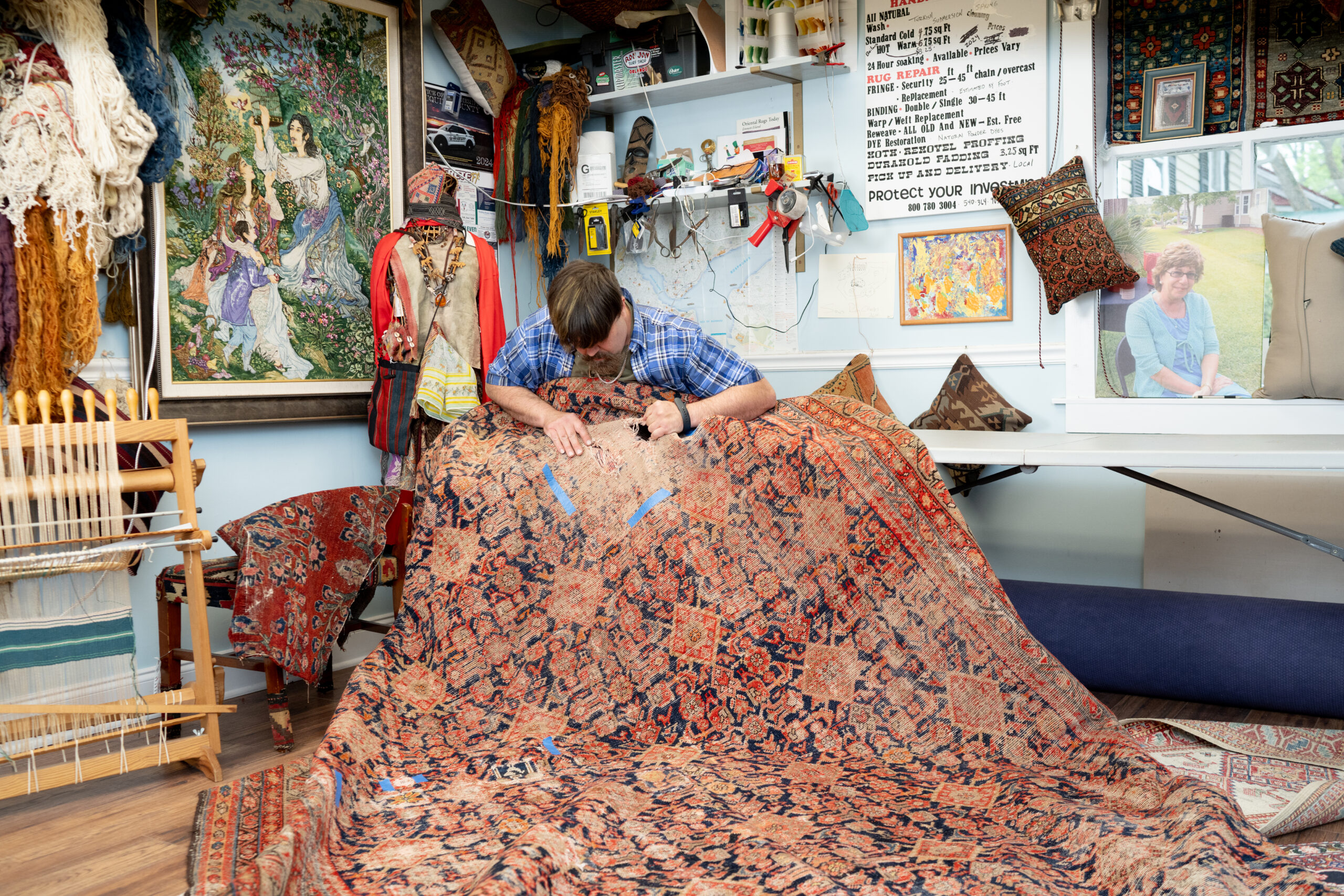
In 1994, Aliff was introduced to the craft that he now calls a career. He and his father worked at Aliloo & Son Rug Gallery in Middleburg for four years. David was the store manager and 14-year-old Aliff was a young apprentice to owner Paul Aliloo. “He’s the reason I’m doing what I’m doing,” says Aliff. “He taught me about Persian rugs. I was drawn to these rugs, and my dad was also. I really listened and very intently took everything I learned and put it into memory.”
The Aliffs then went into business for themselves. For 10 years, they operated in a 2,500-square-foot space in Marshall that had no bathroom, heat, or running water. “We sold coffee, books, furniture, orchids, rugs, silverware, furniture, and gold and silver bars,” recalls Aliff. “In the winter, we would wrap these amazing Navajo rugs around people when they came inside. It’s humbling to think about now.”
Like many dealers, David’s Rugs first carried many types of expensive “city” rugs but discovered a demand for more affordable rugs, so the businessmen shifted their focus to “village” and tribal rugs. City rugs often have more sophisticated dying techniques and materials, and the weavers follow a blueprint. With tribal rugs, on the other hand, the designer and the weaver are the same person, and no two rugs are alike. “I’m a village guy,” says Aliff. “Every rug is named after the city or village where it’s made, and each one is unique.”
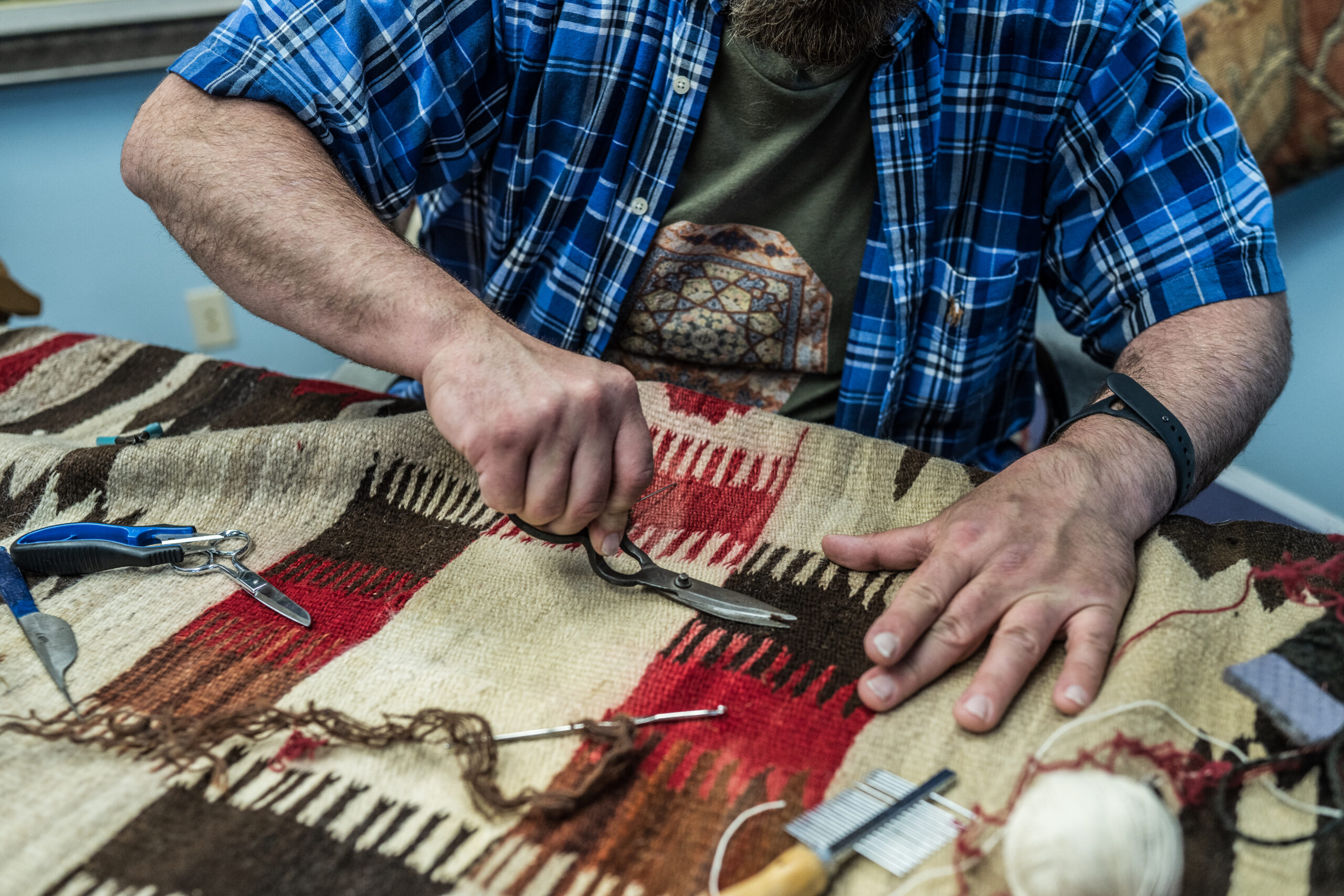
Regardless of the type, the Aliffs regard all rugs as both functional and works of art. “My dad is an artist and has always said the most important thing to pass on is creativity, because it’s the brick that will build your house,” says the now 44-year-old.
Throughout his life, Aliff has turned to creative outlets, including poetry, painting, theater, and music, to navigate hardships and channel grief and anger. “I was terribly bullied as a child. I’ve had so much trauma in my life,” says Aliff, who at 16 suffered severe migraines, blackouts, and constant nausea. He was eventually diagnosed with a condition called Chiari malformation, a structural defect in the cerebellum, resulting in a complicated 10-hour brain surgery, after which he was on bed rest for over six months and had to learn to walk again.
In 2007, Aliff lost his mom to pancreatic cancer, a loss that devastated him. “That was the sad part of my life; it’s so visceral. It was an intense time for me, but with great pain, you get great power,” says Aliff.
After high school, he attended Chowan University for nursing in Murfreesboro, North Carolina, but dropped out after a fortuitous introduction forever changed the course of his life.
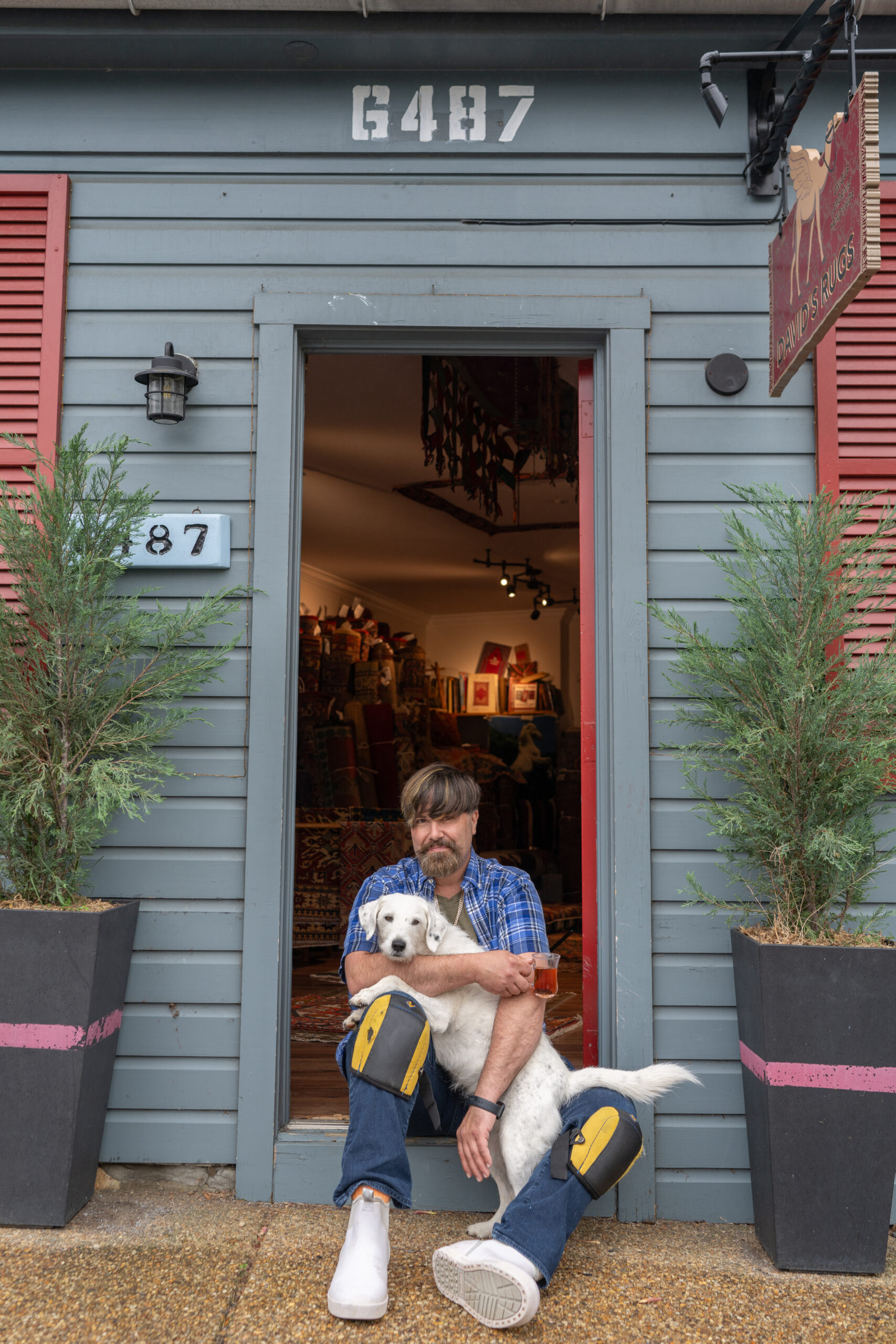
In the summer of 2002, a prominent rug expert named Ismet Odabasio stopped by the shop and was impressed with the Aliffs’ knowledge of rugs. “We only had 100 rugs or so for sale, but he saw my passion and something in my personality and said, ‘Do you have a passport?’ I said, ‘No,’” Aliff laughs. Odabasio told him to apply for one and invited him to his carpet restoration workshop in Turkey.
Thinking it was a joke, Aliff didn’t apply for a passport. Two weeks later when Odabasio came back to the shop and told him his ticket was already purchased, Aliff knew he was being offered a golden opportunity.
In September of 2002, at 22 years old, Aliff boarded a plane to Istanbul, a 14-hour trip and his first time traveling overseas. He recalls the experience as exciting and overwhelming. During the first week, he suffered illness, badly sprained his ankle, and had to navigate a foreign city without speaking or knowing any Turkish.
“I had a really hard time adjusting and was homesick,” says Aliff, who found himself communicating with his teachers by drawing stick figures because of the language barrier. He relied on writing poetry and playing his mandolin for solace. “Ismet wanted me to be very independent. I was mad at first but, in the end, I’m glad he pushed me. I became who I am because of that.”
Aliff lived with Odabasio in the village of Erenkoy and would take a ferry each day to the Sultanahmet area of Istanbul near the Grand Bazaar. For three months, he took classes and acquired hands-on experience with the industry’s top weavers, learning both new and centuries-old weaving, cleaning, and repair techniques in the workshop above Odabasio’s carpet store.
“I was still working on my warp and weft construction. I hadn’t graduated but I could fix almost anything,” Aliff says. The specialty skill set he acquired is why he is in demand today. “I get 200-year-old rugs with holes in them that have been stretched and I have to perfectly patch or reweave the rug.”
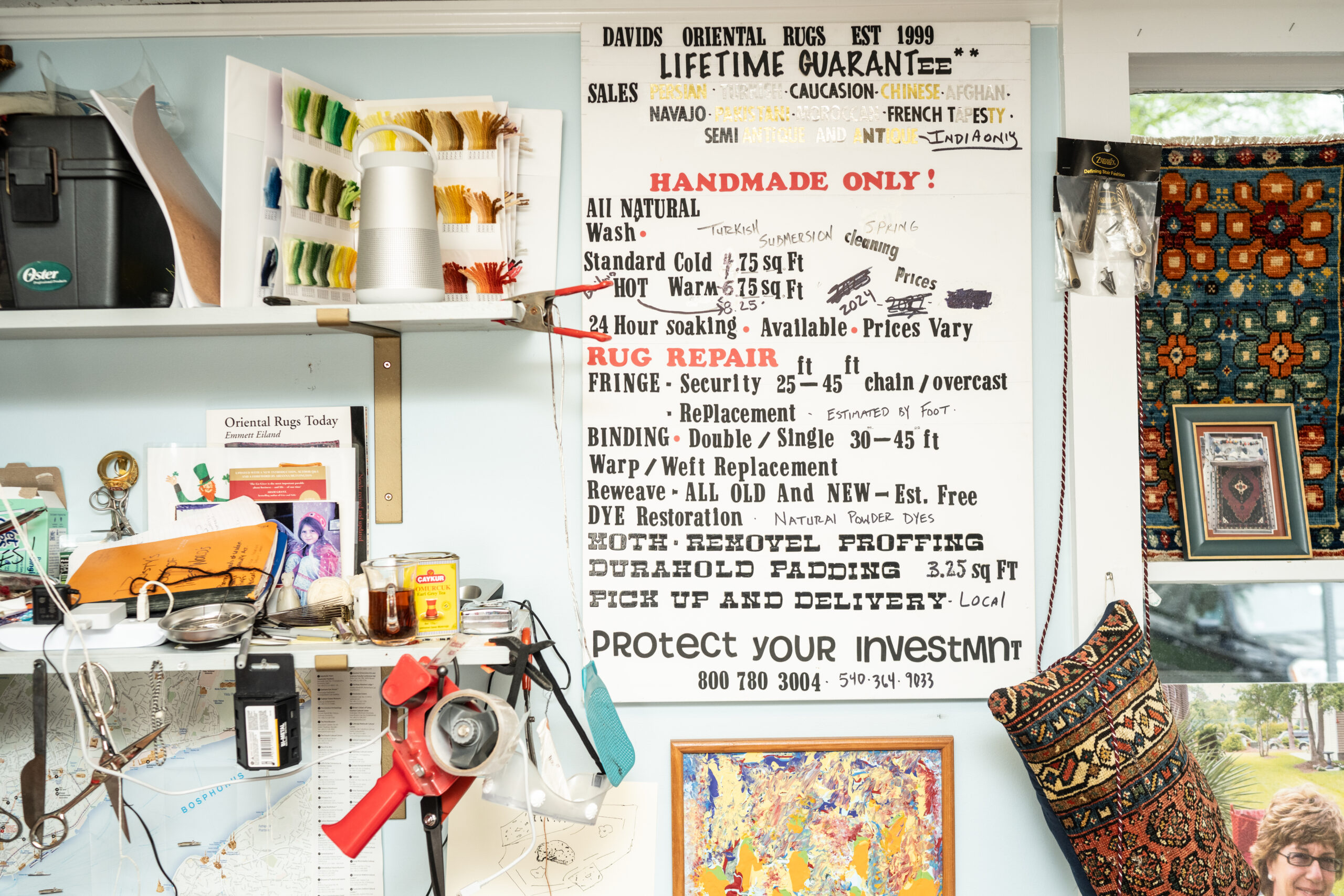
For this, Aliff uses matching remnants from old rugs or reweaves brand new pieces on his loom that exactly match the previous weaver’s work. He then “antiques” the cotton, silk, or wool by soaking it in his own vegetable powder dyes and, finally, putting it in the sun. “There are several techniques that I use to speed up the oxidation process but it’s something you can’t rush,” he says. “I’ll be long gone in 100 years, but this rug will still be here because of me.”
Cleaning rugs is also tedious and labor intensive. “Turkish washing is what I do the best. I don’t buy it if I can’t clean it, and I can’t clean it unless I can put it under water.” Aliff continues, “It’s a dirty job. Imagine what I see: I see people’s lives. These treasures could have been thrown in the dump, but I get to clean them. It’s an honor to take care of them.”
In 2014, Aliff officially became a Master Weaver during his third trip to Turkey after completing more than 1,200 hours of rug and carpet restoration. “Once you learn my craft, you can go anywhere in the world,” says Aliff, who grew up in Sumerduck in Fauquier County and chose to plant roots in the area he’s always called home.
To stay focused and centered, Aliff practices a daily mantra he’s been using for years and loves to share. “KIP stands for kindness, intelligence, and patience. It’s something that really helps me. In its simplest form, I try to show kindness to everyone I meet,” he says. “The intelligence is educating myself each day, and patience is something I’m always working on.”
Sirius, the shop dog, helps too. Of the Jack Russel-Dalmatian mix, Aliff says, “He’s the gatekeeper, my best friend.”
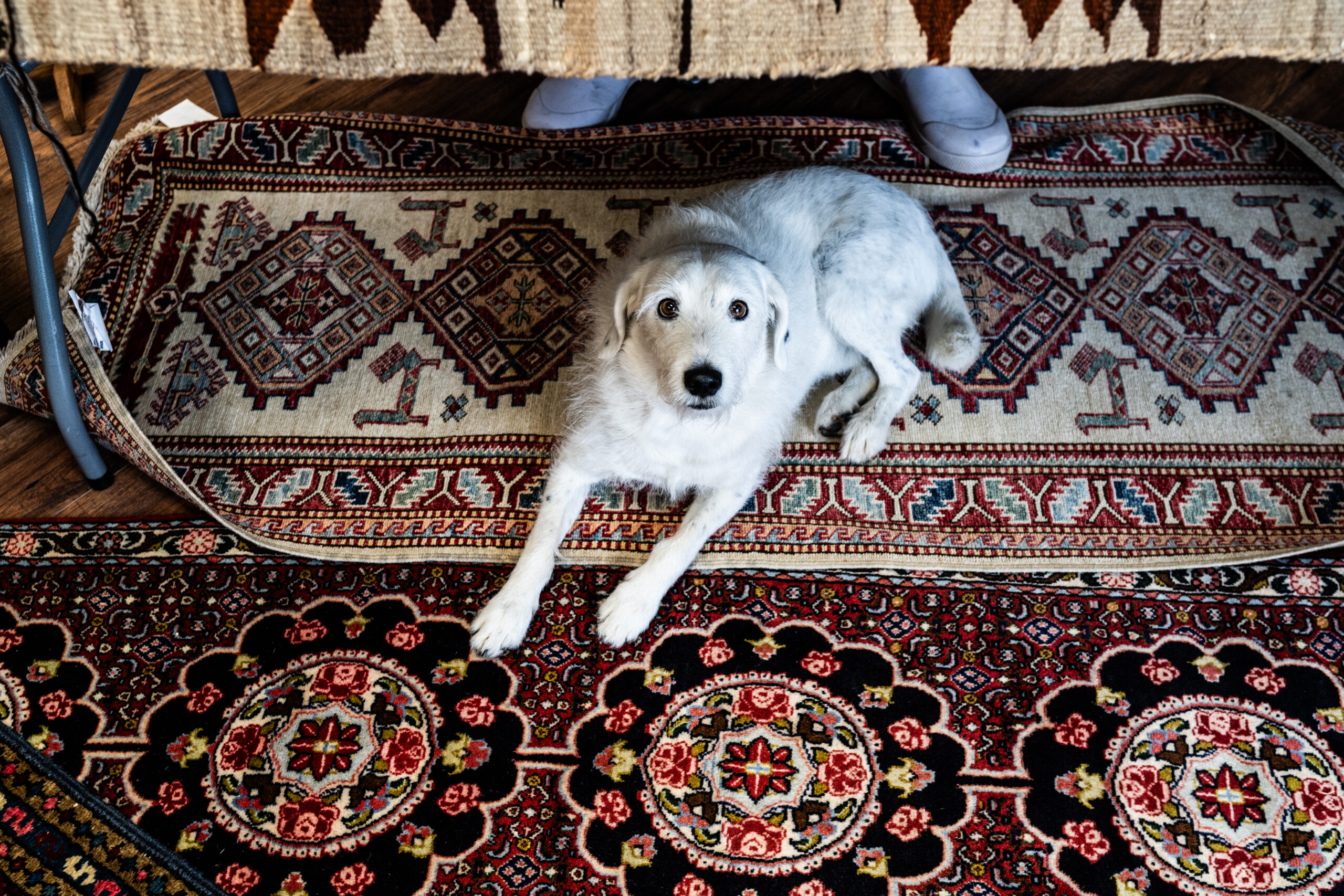
His reverence for the work he does is something Aliff is passionate about sharing, especially as the handmade weaving traditions are slowly being replaced by mass production. “I love when people leave my shop with a different perspective. I want to educate them about these rugs,” he says. “Someone sat for hours and hours of blood, sweat, and tears, and probably got paid very little to create this piece of art.”
After all these years, the Aliffs continue to enjoy a robust business doing what they love. “Maybe after 24 years, the word [has] gotten out,” he laughs. “I tell people, you’re not buying a rug; you’re buying an experience. The rug’s a bonus.” ML
For more information, visit davidsrugs.com.
Published in the May 2024 issue of Middleburg Life.








